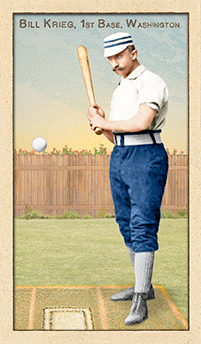
- Series: Beginnings: 1880's
- City: Washington, D.C.
- Team: Nationals
- League: National League
William Frederick Krieg (1859-1930) was a powerhouse in the minors, but barely left an impression in the big leagues. Coming out of Notre Dame, Krieg joined the Northwestern League's Springfield and Peoria teams in 1883. The following season he got a chance at the big time as the Union Association multiplied opportunities for young pro players. He signed on with the bi-city Chicago/Pittsburgh entry as their catcher, playing in 71 games with a .247 average. Over the next three seasons, Bill would roam among three other major league clubs and various minor league teams. His stints in the American Association and National League were brief and his output paltry.
When he finally resigned himself to play in the minors permanently, Krieg came into his own. In 1887 with the Minneapolis Millers he batted .402, second in the Northwestern League. He then became a terror in the Western Association, hitting .324 with St. Joseph in '89 and .339 with Milwaukee in ‘92, good for his first batting title. His second title was historically good, when he ravaged WA pitchers for an astounding .452 performance with the Rockford Forest Citys in 1895. He was the team's slugger, tallying 15 triples and 12 home runs.
While Krieg's time in the majors was brief, he showed remarkable durability in the game. He finally retired as a player in 1901 at age 42, but served one more season as manager for the Southern League Chattanooga squad. Bill even returned for one last hurrah as manager of Muscatine of the Central Association in 1912.
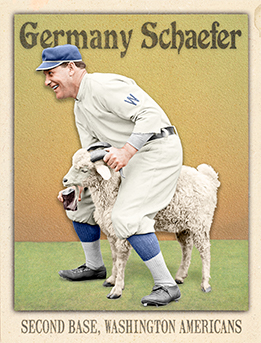
- Series: Diamond Heads '15
- City: Washington, D.C.
- Team: Senators
- League: American League
Herman A. Schaefer (1876-1919) was the Clown Prince of baseball for nearly two decades in the early years of the last century. “Germany” (or “Liberty” as he thought a better nickname after WWI began) was beloved for his antics on the field. In its obituary, the New York Times said he was “one of the most popular figures on the diamond.” Born into the tough German immigrant district of south Chicago, the stocky Schaefer came up through semi-pro ball and soon made it to the Cubs in late 1901. A slump the following year sent him to the PCL and other minor league teams before the Tigers brought him back to the bigs in '05. Legends surrounded the colorful Schaefer and it is hard to tell fact from fiction. He was said to have called shots long before the Babe, make dramatic self-narrated trips around the bases and harangue mercilessly some of the greats of his day. One of his most storied feats involved his famed steal of first, accomplished from second base in order to tempt a run-scoring errant throw. After his death, baseball officially outlawed such depredations. John McGraw hired Schaefer as a scout in 1919 but the bantam joker succumbed to a TB-induced hemorrhage on a train trip to check on NY talent.
- Germany played for six MLB teams including the Federal League's Newark Peppers. He closed his career with Cleveland months before his untimely death
- His lifetime .257 average belied his ability to deliver clutch hits, seemingly at will, when the moment was right
- A Detroit sportswriter effused: “Germany Schaefer was the soul of baseball itself, with all its sorrows and joys, the born troubadour of the game.”
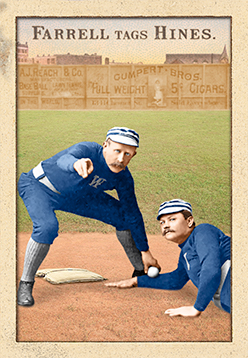
- Series: 1880s: Diamond Duos
- City: Washington, D.C.
- Team: Nationals
- League: National League
Jack Farrell:
John A. Farrell (1857-1914). Known as Moose, Farrell played 2nd base for 5 teams over 11 seasons. Jack also served as player/manager for the 1881 Providence Grays and achieved a 24-27 record before quitting as the captain. A light hitter, Jack’s defense was excellent and he either led or finished near the lead in many defensive categories for second basemen throughout his career.
- Led NL in assists with 365 in 1883
- Led NL in assists for 2B twice: 1881 & 1883
- Led NL in double plays for 2B in 1883
- Led NL in FLDG% for 2B in 1883 with .924
- Ranks 26th all-time in range factor at 2B
Paul Hines:
Paul Aloysius Hines (1855-1935). A hearing-impaired center fielder for 16 professional seasons, Hines accumulated the most hits in the first 5 years of National League history and, upon his retirement in 1891, was 3rd all-time in hits behind Cap Anson & Jim O’Rourke.
- Won baseball’s 1st Triple Crown: 1878
- May have recorded the 1st unassisted triple-play in history
- Twice won the batting title
Artist's Note:
- The uniform colors on this card were changed in April, 2017 from black to blue to reflect recent reliable research by Craig Brown & friends at Threads of Our Game. Two cards were previously released featuring black uniforms.
Auction History
Cartophilia
Old Judge Pose: 154-3
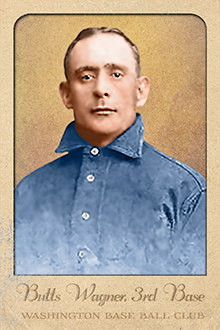
- Series: Pioneer Portraits II: 1875-1899
- City: Washington, D.C.
- Team: Senators
- League: National League
Albert Wagner (1871-1928) followed his kid brother Johannes (Honus) into the big leagues in 1898. The Pittsburgh native got his professional start in Steubenville of the Interstate League in 1895 when he was already 23. He moved to the Warren, PA entry in the Iron and Oil League the same season and later played infield and some outfield for the Canton Deubers and Wheeling Nailers back in the Interstate League. Butts then moved up to the Eastern League's Toronto Canadians/Canucks for the 1896-97 campaigns before getting his shot in MLB with the NL's Senators. His best game came after Washington dealt him to the Brooklyn Bridegrooms later in the '98 season. Wagner hit his only home run, doubled and scored three times in a 9-5 win on July 4. Honus, two years Butts' junior, had begun with the same Steubenville squad in 1895 after Al urged the manager to give him a tryout. Both Wagner boys had been barbers. Honus and Butts parted company the same year when the shortstop-for-the-ages moved on to the Michigan State League and a call-up in '97 to the Louisville Colonels and a National League career in baseball's stratosphere. Al returned to Pittsburgh and his barber chair.
- Butts' “career” stats included a .226 average in 74 MLB games
- However modest Butts' numbers, he can be rightly regarded as an all-time great scout
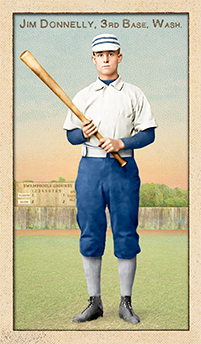
- Series: Beginnings: 1880's
- City: Washington, D.C.
- Team: Nationals
- League: National League
James B. Donnelly (1865-1915) had eleven seasons in the majors, playing third base for nine teams. While he toiled in relative obscurity for most of his career, Donnelly had the thrill, in its waning days, of being part of a remarkable championship season with the Orioles in 1896. In that storied year, the club walked away with its third straight NL pennant, besting second-place Cleveland to win the Temple Cup in the post-season. Donnelly had, by far, his greatest offensive production in ‘96, hitting .328 - over a hundred points above his lifetime average. That effort would have been a headliner for any other team, but in Baltimore Donnelly was only the sixth-best on the squad. Jim was overshadowed by pretty good men: Wilbert Robinson .347, Jack Doyle .339, Hughie Jennings .401, Willie Keeler .386, and Joe Kelley .364. Talk about Murderers Row! The Ned Hanlon/John McGraw powerhouse was soon to disband as the NL went from twelve to eight teams to accommodate the new American League a few years later.




